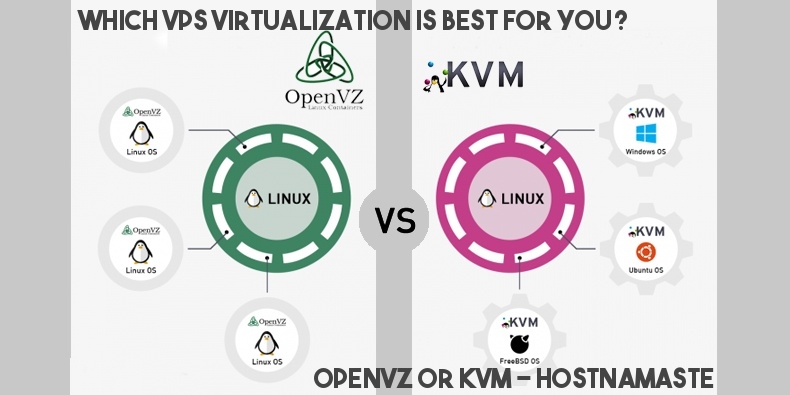
Which VPS Virtualization Is Best for You? – OpenVZ OR KVM – HostNamaste
Recent years have seen a few significant developments in the web services industry. With the evolving digital technology and the rising demands of businesses, experts have introduced Virtual Private Servers or VPS to host websites. This hosting solution eradicates the problems created by shared hosting servers. Today, we will review OpenVZ and KVM, the two virtualization technologies for VPS hosting.
OpenVZ and KVM are the most popular virtualization technologies in the VPS hosting sectors. Everyone opts for one of these options, from individuals to corporate enterprises, while choosing their VPS hosting plan. Let’s unfold some facts and details about the two technologies to help you understand them better.
OpenVZ Virtualization – An Overview
OpenVZ is a Linux-based virtualization system with an open-source nature. It uses a two-level disk quota, isolating the Linux server into separate partitions. OpenVZ uses a single kernel only. Users will be able to run Linux alone on the OpenVZ platform. This OpenVZ Virtualization platform is completely free to access and use.
Features of OpenVZ
Here are the key features of the OpenVZ platform.
-
Easier Setup
The OpenVZ platform has the edge of easy installation and setup. You can scale your OpenVZ VPS hosting plan according to your website needs.
-
Controlled Resources Overhead
Another valuable feature that the OpenVZ users can enjoy is a controlled overhead for installing hardware resources.
-
Efficient Management
Having a good hosting solution for your website is not enough. If your hosting platform does not provide an efficient management system, you may want to rethink your choice. Thanks to OpenVZ virtualization for its super-efficient configuration.
-
Isolated Traffic
The default configuration of the OpenVZ virtualization allows it to isolate the individual containers for improved data security and privacy.
KVM Virtualization – An Overview
KVM is another option for the virtualization of the hosting servers. Many individual and professional setups prefer opting for KVM Virtualization. KVM or Kernel-based Virtual Machine is a platform that allows users to use the Linux server as a hypervisor.
This conversion allows the server to split into multiple VMs. The hypervisor provides dedicated hardware support to individual virtual machines.
Features of KVM
Here are the core features of KVM virtualization.
-
Dedicated Hardware Support
Since KVM plays the role of a hypervisor, you can enjoy dedicated hardware support, including CPU, network management, and graphics adapter.
-
Live Migration
One of the vital features of the KVM platform is its live migration. You do not have to worry about an extensive downtime to transfer your backup to other servers.
-
Dynamic Management
The flexible platform management tools allow you to set your preferences and access unlimited free resources to install programs on your computer.
-
Nested Support
Another vital feature of the KVM virtualization platform is nested guest support. You can create virtual machines within the main server to meet your requirements.
How Hardware Configuration Varies for OpenVZ and KVM?
We have mentioned the differences below if you wonder how the two virtualizations vary based on their hardware requirements.
The OpenVZ platform operates its containers with a minimal overhead on the host’s hardware resources. It does not require a hypervisor to distribute resources between the created partitions. You can distribute up to 99% of the physical hardware among individual containers.
On the other hand, KVM requires a hypervisor to operate. Since KVM can take up the hypervisor role, you only need a computing power source to operate it. While this is valid, the constant need for computing power restricts the distribution of the system’s resources among the guest VMs.
Kernel-Version Differences
One of the key classifications between OpenVZ and KVM is the difference between the kernels of the two virtualization platforms.
KVM has the edge over the OpenVZ platform for its enhanced customization options. Virtual machines operate in an isolated setting, allowing the administrators to modify individual virtual machines. Any modifications made by the administrators do not affect the other VMs on the same server.
OpenVZ platform operates on the host’s kernel. Any customizations may directly affect the other VMs on the same server. If you opt for OpenVZ, you may be unable to make any modifications.
Operating System Requirements
When it comes down to the OS specifications, KVM leads the competition due to its versatile system support. Depending on your needs, you can run KVM VPS on Linux, Windows, or a FreeBSD OS. It is worth mentioning that most KVM users opt for Linux-based KVM systems.
OpenVZ does not provide its users with the freedom to choose any OS. It is a Linux-based platform with all its containers running on Linux systems.
Is OpenVZ Cheaper Than KVM?
Before we talk about the prices of the two OpenVZ and KVM Virtualization platforms, it is important to note that both platforms are open-source (free). You can access and download them on any Linux system to use.
Considering the prices, the OpenVZ platform has lower installation costs and easier configuration methods, making it an optimal choice for small and large companies. On the other hand, the KVM platform requires high-end hardware. Moreover, you may need to seek expert assistance to set up your KVM VPS server.
Which Virtualization is Better?

Choosing the best virtualization technology for your website can be tricky. You may need to evaluate the pros and cons of each based on your preferences. If you seek a VPS hosting solution that offers you a high-end configuration and better scalability, KVM may be an ideal choice.
If your primary concern is budget, opting for OpenVZ can benefit you more. You can enjoy all the features except a few for a reasonable fee.
The Takeaway
Virtual Private Servers (VPS) are the most optimal choice for hosting websites. It is more flexible and secure than the other hosting types in the industry.
To find out the ideal VPS hosting plan for your website, contact one of our hosting experts to provide thorough guidance on choosing the right strategy. If you need more information about OpenVZ and KVM Virtualization platforms, we can help you identify the differences between the two platforms.


